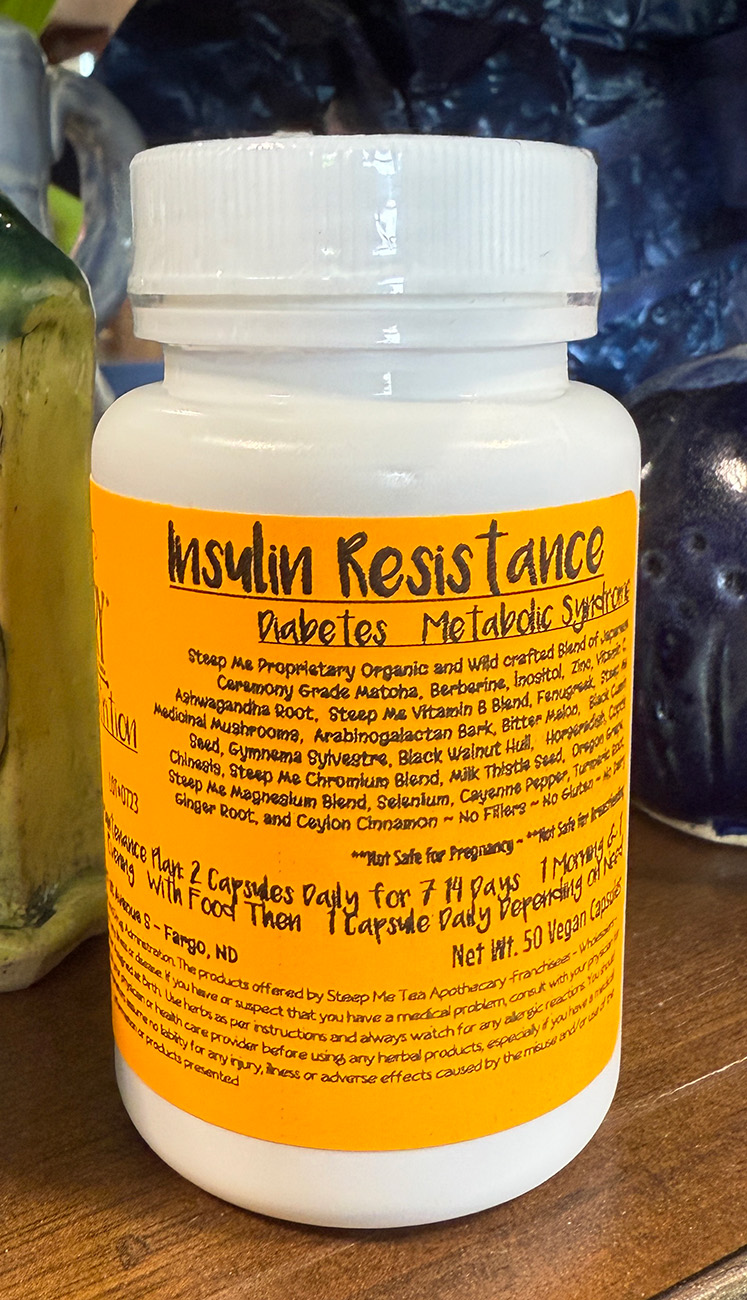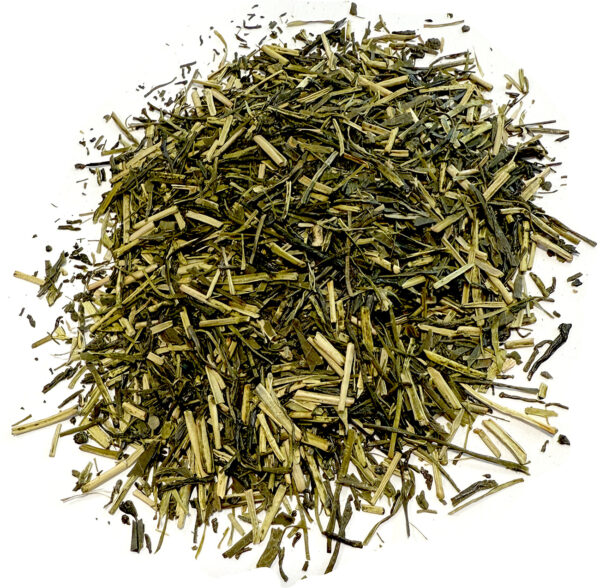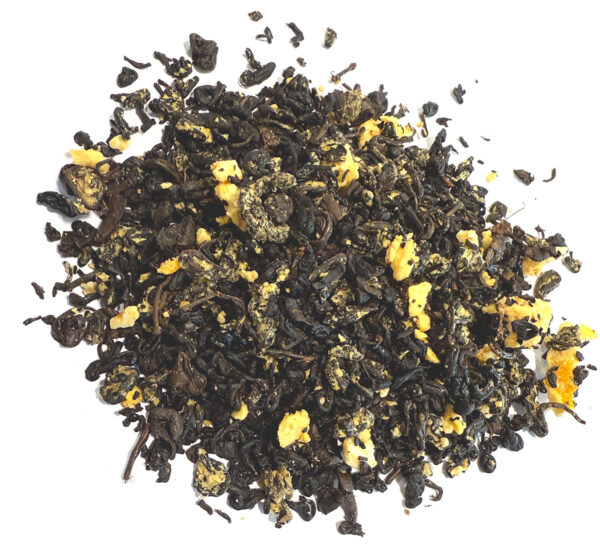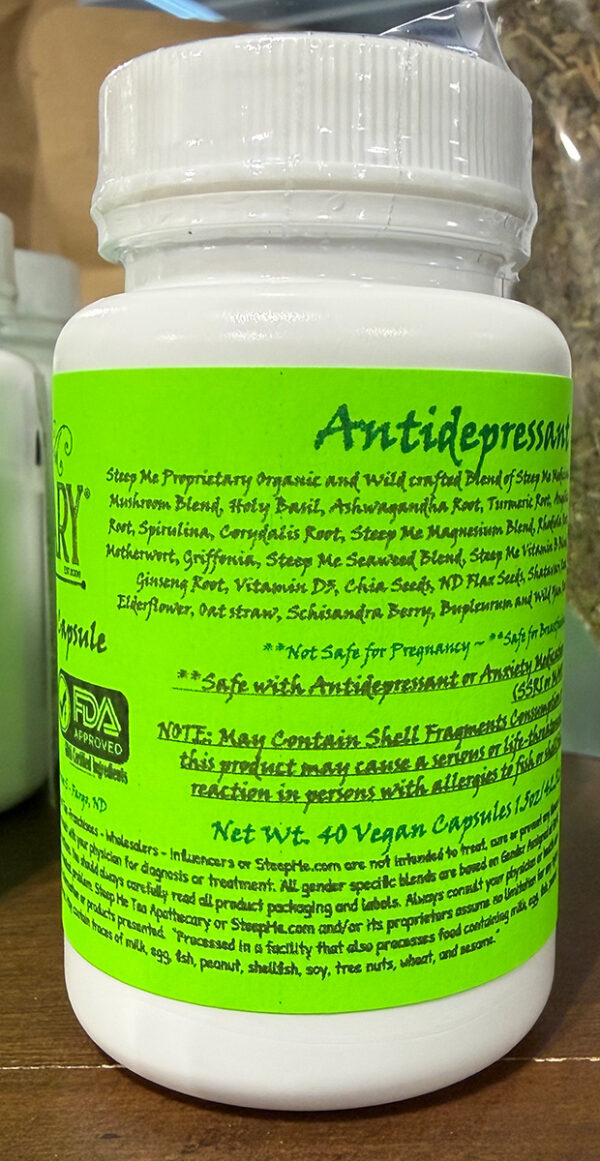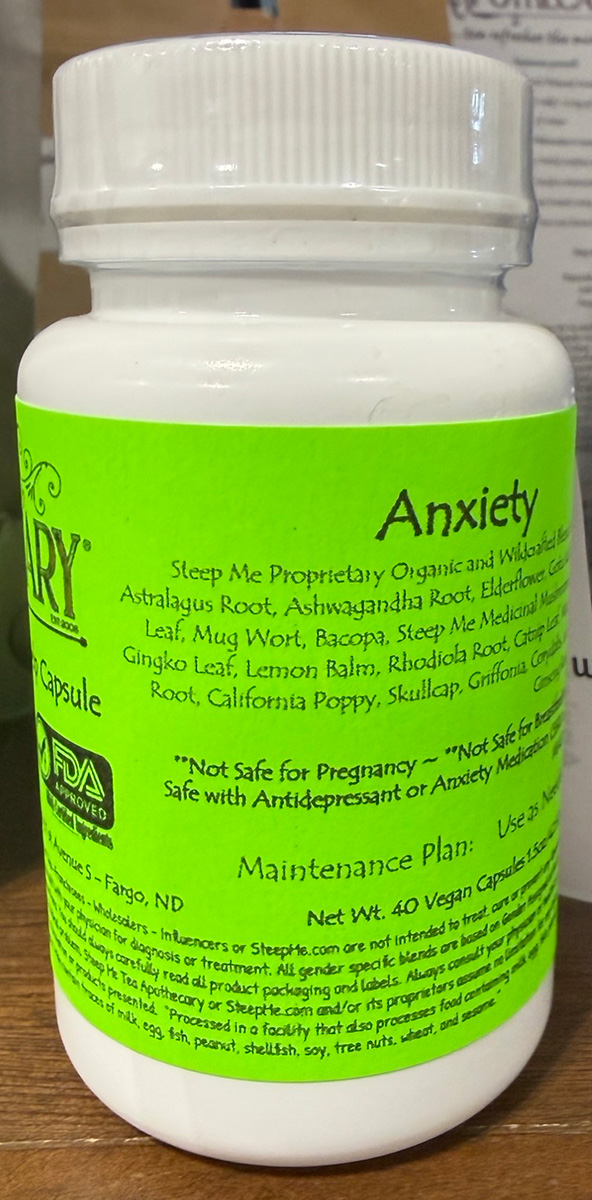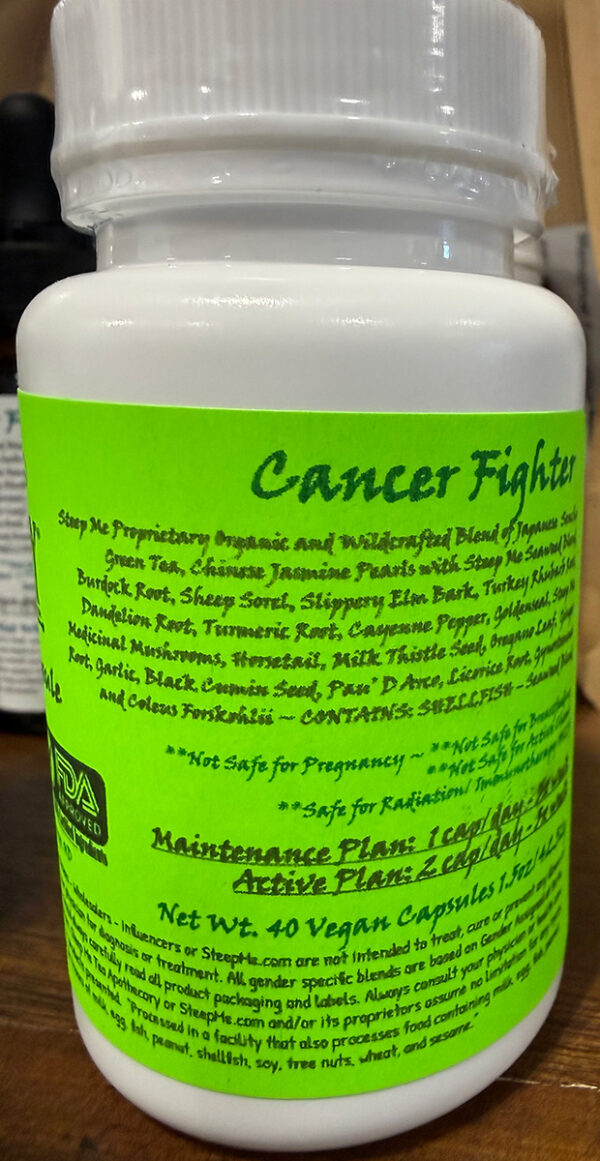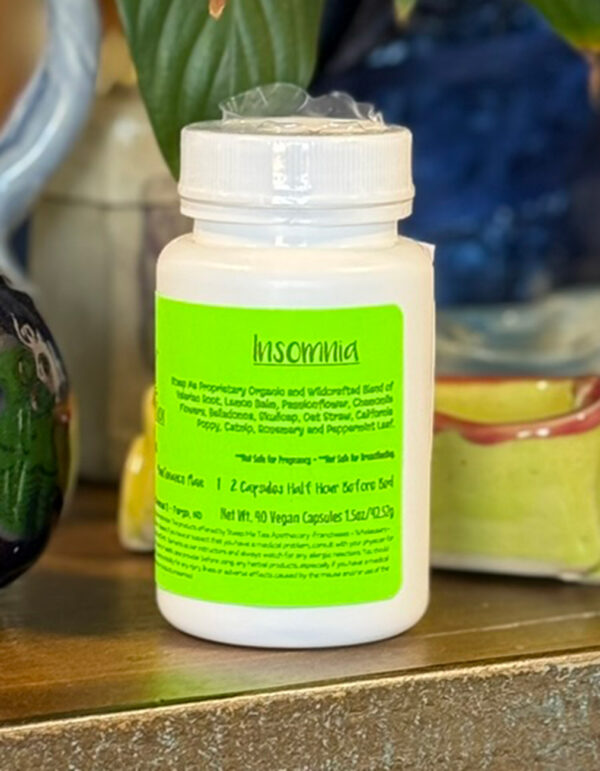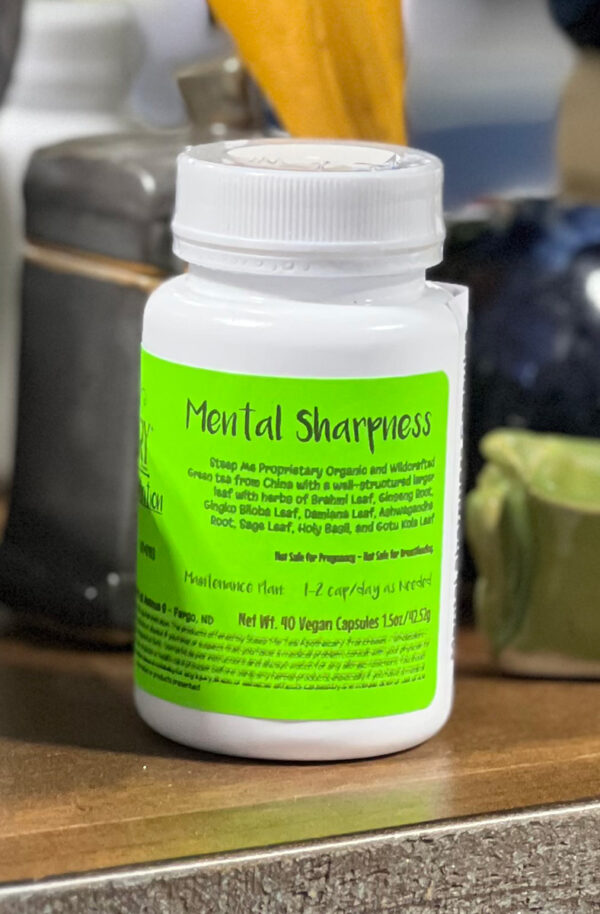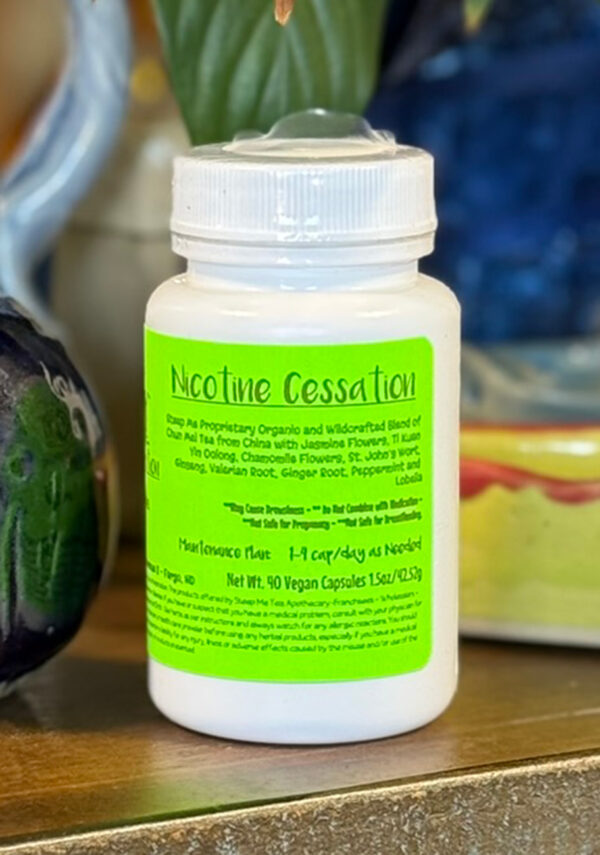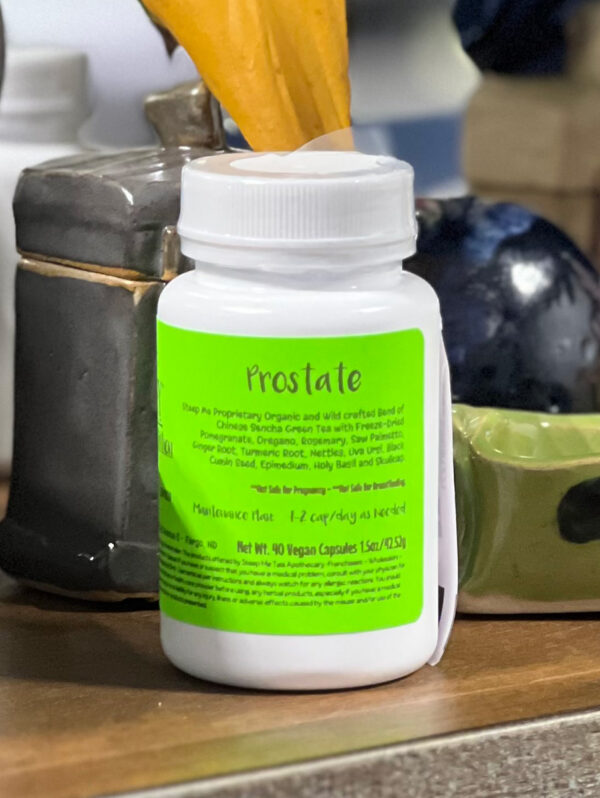With over 400 different kinds of loose tea that will exceed all tea lover’s expectations. You’re sure to find something you will love! All handcrafted by us in North Dakota.
Insulin Resistance ~ Diabetes ~ Metabolic Syndrome ~ Micro-Nutrition
$90.95
With this blend we are providing a healthy and potent blend of herbs and vitamins to help the body with Insulin Resistance and in turn help with Metabolic Syndrome.
SKU:
Insulin Resistance ~ Diabetes ~ Metabolic Syndrome ~ Micro-Nutrition
Categories: Capsules, Micro-Nutrition
Description
Blender’s Notes Insulin Resistance ~ Diabetes ~ Metabolic Syndrome ~ Micro-Nutrition:
Steep Me Micro-Nutrition combinations are a wonderful way to get health benefits from different combinations of Vitamins and Minerals. With this blend we are providing a healthy and potent blend of herbs and vitamins to help the body with Insulin Resistance and in turn help with Metabolic Syndrome. What is Insulin Resistance? Insulin resistance happens when cells in your muscles, fat and liver do not respond to insulin as they should. This is also known as impaired insulin sensitivity. Insulin is essential for life and regulating blood glucose (sugar) levels. Insulin helps move glucose from your blood into your cells so your body can use it for energy. For several reasons, your cells can respond inappropriately to insulin. This means they cannot efficiently use glucose for energy or for storage. Insulin regulates the amount of glucose that circulates in the bloodstream. It induces the cells to absorb glucose from the food people eat. Insulin usually helps the body maintain a good balance of energy by preventing the level of blood glucose from spiking for too long. Insulin usually helps the body maintain a good balance of energy by preventing the level of blood glucose from spiking for too long. The reasons for insulin resistance remain complex, and researchers continue to investigate. The following steps outline the current understanding of how insulin resistance develops ~ Insulin loses its ability to support body cells effectively ~ At first, the pancreas secretes more insulin in order to maintain safe blood sugar levels ~ The pancreas becomes unable to maintain the release of extra insulin to compensate for the cells’ increasing resistance ~ Consistently high levels of blood glucose develop, which can lead to prediabetes and type 2 diabetes if an individual is unable to receive treatment and manage blood sugar levels. Acquired causes of the condition, meaning you are not born with the cause, include ~ Excess body fat: Scientists believe obesity is a primary cause of insulin resistance. Excess fat in your belly and around your organs (visceral fat) especially raises your risk. Physical inactivity: Movement and exercise make your body more sensitive to insulin. Exercise also builds muscle that can absorb blood glucose. A lack of physical activity can lead to the condition. Food choices: A diet of highly processed foods, high in carbohydrates and saturated fats, has been linked to the condition. Certain medications: Steroids, blood pressure medications, HIV treatments and other medications can cause insulin resistance. Insulin resistance: Causes, symptoms, and prevention
What is Metabolic Syndrome? Metabolic syndrome, also known as syndrome X, is not a single disease but a collection of risk factors that occur together. Individuals with metabolic syndrome are at a higher risk of experiencing a range of health complications, including cardiovascular disease, type 2 diabetes, non-alcoholic fatty liver disease and certain types of cancer. The incidence of metabolic syndrome has been increasing over the past few decades and is predicted to continue escalating in the coming years. According to the National Heart, Lung, and Blood Institute (NHLBI), a person is diagnosed with metabolic syndrome if they have three or more of the following conditions. To be diagnosed with metabolic syndrome, a person typically must have at least three of the following risk factors ~ Abdominal obesity (increased waist circumference – men: 40 inches (102 cm), women: 35 inches (89 cm) ~ Elevated blood pressure ~ High fasting blood sugar levels – 100 (mg/dL) or 5.6 (mmol/L) ~ Abnormal cholesterol levels (high triglycerides – 150 (mg/dL) or 1.7 (mmol/L) or higher or Reduced “good” HDL cholesterol – men: > 40 (mg/dL) or 1.04 (mmol/L) ~ Increased blood pressure – 130/85 (mm Hg) or higher. The development of metabolic syndrome is multifactorial, with a complex interplay of genetic, lifestyle, and environmental factors contributing to its onset. While the exact causes are not fully understood, researchers have identified several key factors that play a significant role in the emergence of this condition. One of the primary drivers of metabolic syndrome is insulin resistance, resulting in high blood sugar levels and an increased risk of type 2 diabetes. Lifestyle factors, such as a sedentary lifestyle, poor dietary choices, and excess weight, are strongly linked to the development of insulin resistance. Abdominal obesity, often referred to as “visceral fat,” is another key component of metabolic syndrome. This pattern of fat distribution is particularly problematic as it is associated with increased inflammation and the release of inflammatory cytokines, which can further exacerbate insulin resistance and other metabolic disturbances. Genetic predisposition also plays a significant role in the development of metabolic syndrome. Certain genetic variants can influence an individual’s susceptibility to insulin resistance, obesity, and other metabolic abnormalities. Additionally, epigenetic factors, such as environmental exposures and lifestyle choices, can interact with genetic predispositions and contribute to the manifestation of metabolic syndrome. Chronic stress and hormonal imbalances have also been identified as potential contributors to metabolic syndrome. Prolonged exposure to stress can lead to the overproduction of cortisol, a hormone that can disrupt glucose and lipid metabolism, as well as promote the accumulation of abdominal fat. While lifestyle changes like diet and exercise are fundamental to the management of metabolic syndrome, herbal interventions offer a complementary approach to managing and mitigating the effects of this presentation. There are a few herbs that really shine in this arena, as they have demonstrated the ability to address more than one of these targets simultaneously. The Herbal Approach to Metabolic Syndrome – BotanicalMedicine.org
Relationship Between Insulin Resistance and Metabolic Syndrome. While insulin resistance can lead to the development of metabolic syndrome, they are not the same. Insulin resistance is one of the factors that can contribute to the risk factors associated with metabolic syndrome. In other words, a person with insulin resistance may develop metabolic syndrome if they also exhibit other risk factors such as obesity or high blood pressure. However, not everyone with metabolic syndrome has insulin resistance, and some individuals may be insulin resistant without meeting the criteria for metabolic syndrome.
In this blend we based it off our Japanese Ceremony Grade Matcha. Matcha tea has promising benefits for insulin resistance, thanks to its rich concentration of antioxidants and bioactive compounds. Matcha is high in EGCG (Epigallocatechin gallate) which is a powerful catechin that has been shown to improve insulin sensitivity and help cells respond more effectively to insulin. Matcha may slow carbohydrate digestion and glucose absorption, leading to more stable blood sugar levels after meals. Chronic inflammation is linked to insulin resistance. Matcha’s antioxidants help reduce inflammation, potentially improving insulin function. Matcha contains L-theanine, which may lower cortisol levels—a hormone that can interfere with insulin sensitivity and Matcha may boost metabolism and fat burning, especially belly fat, which is strongly associated with insulin resistance. In this blend we added Berberine. Berberine Impacts Insulin Resistance by helping cells absorb glucose more efficiently, reducing the need for excess insulin. AMPK plays a key role in energy balance and metabolism. Berberine’s activation of AMPK enhances insulin sensitivity and reduces blood sugar levels. Berberine can increase insulin release in a dose-dependent manner, and it inhibits the liver’s production of glucose, helping lower fasting blood sugar. Berberine may help promote beneficial bacteria and reduce inflammation, which is linked to metabolic dysfunction. It can lower LDL cholesterol and triglycerides while increasing HDL. Berberine has shown potential in reducing BMI and waist circumference in clinical trials. Plus, it offers anti-inflammatory effects that may help with joint health and cardiovascular protection and has neuroprotective and antidepressant-like properties. Next is Inositol. Inositol is a naturally occurring sugar alcohol that plays a key role in insulin signaling and metabolic health. How it works, Inositol acts as a second messenger in insulin signaling pathways, supports glucose uptake and metabolism, enhances insulin sensitivity in tissues like muscle and liver, helps regulate lipid metabolism and hormone balance. Inositol supplementation has shown to enhance cellular response to insulin, help lower fasting glucose and post-meal spikes, reduce triglycerides, and improve HDL/LDL balance and address hormone imbalances. Next, we included Zinc. Zinc is essential for insulin synthesis, storage, and secretion in pancreatic β-cells. It has insulin-mimetic properties, meaning it can activate insulin signaling pathways, helping glucose uptake in tissues like muscle and fat. Zinc inhibits enzymes like protein-tyrosine phosphatases, which normally dampen insulin signaling. Zinc reduces oxidative stress and inflammation, both of which are key drivers of insulin resistance and suppresses inflammatory cytokines like TNF-α and IL-6, which interfere with insulin signaling. Zinc supplementation has been shown to improve insulin sensitivity, reduce fasting glucose, and lower insulin resistance markers like HOMA-IR in obese individuals and women with gestational diabetes, zinc supplementation led to better glucose metabolism. Zinc deficiency is common in people with obesity and metabolic syndrome and low zinc levels are associated with higher BMI, waist circumference, and inflammatory markers, all of which contribute to metabolic syndrome. Next, we added Vitamin C because it helps neutralize reactive oxygen species (ROS), which are elevated in insulin-resistant states and contribute to cellular damage. Vitamin C can reduce fasting insulin levels and improve HOMA-IR scores, especially in people with type 2 diabetes and has been linked to lower markers of oxidative stress, which are associated with insulin resistance.
Ashwagandha was also included. Ashwagandha enhances glucose uptake in muscle cells and improves insulin receptor function, which helps lower blood sugar levels. Chronic stress elevates cortisol, which impairs insulin action. Ashwagandha’s adaptogenic effects help normalize cortisol, indirectly supporting insulin sensitivity. Metabolic syndrome is driven by low-grade inflammation and oxidative stress. Ashwagandha suppresses pro-inflammatory cytokines (like TNF-α and IL-6) and boosts antioxidant defenses. It lowers LDL and triglycerides while increasing HDL, helping combat dyslipidemia, a key component of metabolic syndrome. Hormonal imbalances can worsen insulin resistance. Ashwagandha may help regulate thyroid hormones, which play a role in metabolism. Next, we added in our Steep Me Vitamin B Blend. Low levels of Vitamin B are associated with increased risk of metabolic syndrome and insulin resistance. Supplementation may improve insulin sensitivity and endothelial function. Vitamin B helps regulate homocysteine, which is linked to cardiovascular risk and insulin resistance and higher intake is inversely associated with metabolic syndrome incidence. Vitamin B plays a role in amino acid metabolism and neurotransmitter synthesis and adequate levels may help reduce inflammation and oxidative stress, both of which contribute to insulin resistance. Vitamin B is essential for glucose metabolism and supplementation may help improve glucose utilization and vascular function. Fenugreek was included because of its rich profile of bioactive compounds like diosgenin, 4-hydroxyisoleucine, and soluble fiber. Fenugreek may enhance insulin sensitivity and secretion, which are key to controlling blood sugar levels. Fenugreek has been linked to reductions in fasting blood glucose and HbA1c levels in people with type 2 diabetes. It may lower triglycerides and LDL cholesterol while boosting HDL, helping reduce cardiovascular risks associated with metabolic syndrome. Fenugreek’s antioxidant properties may reduce inflammation, a contributor to insulin resistance and Fenugreek can help reduce waist circumference and body fat percentage. Steep Me Medicinal Mushrooms we also added. Medicinal mushrooms contain bioactive compounds like polysaccharides (especially β-glucans), terpenoids, phenolic compounds, and essential vitamins that interact with key metabolic pathways ~ Improve insulin sensitivity by enhancing insulin signaling and glucose uptake in cells z~ Modulate gut microbiota, which plays a crucial role in metabolic health and inflammation ~ Reduce sugar and fat absorption, aiding in weight management ~ Stimulate insulin production and protect pancreatic β-cells ~ Balance lipid metabolism, reducing harmful fat accumulation and Lower chronic inflammation, a major contributor to insulin resistance. Many of these mushroom’s function as prebiotics, feeding beneficial gut bacteria. A healthy gut microbiome improves nutrient absorption, reduces inflammation, and supports insulin sensitivity. Arabinogalactan Bark was added because it is a soluble fiber derived from the bark of the larch tree (Larix spp.), has shown promising effects in improving insulin resistance. Arabinogalactan promotes the growth of beneficial gut bacteria like Bifidobacterium longum and Faecalibacterium prausnitzii, which are linked to improved metabolic health. Fermentation of arabinogalactan in the colon produces SCFAs like butyrate, which help regulate glucose metabolism and reduce inflammation and it may enhance gut integrity, reducing endotoxin leakage that contributes to insulin resistance.
Next, we added Bitter Melon. Bitter melon contains compounds like charantin, vicine, and polypeptide-p, which may mimic insulin and help lower blood glucose levels. Bitter melon may improve insulin signaling and increase glucose uptake in cells. Bitter Melon may help reduce triglycerides and cholesterol, which are key markers in metabolic syndrome, and it might influence hormones like GLP-1, which regulate appetite and blood sugar. Black Cumin was also added. It contains rich profile of bioactive compounds like thymoquinone. This star compound in black cumin, known for its hypoglycemic, anti-inflammatory, and antioxidant properties and influences genes involved in fat metabolism, glucose transport, and insulin signaling. Black cumin can reduce HbA1c levels, indicating better long-term blood sugar control. It may increase insulin production and decrease insulin resistance, helping cells respond more effectively to insulin. Black cumin’s compounds help reduce oxidative stress and inflammation, both of which contribute to insulin resistance and metabolic syndrome. Black Cumin has been linked to lower LDL cholesterol and triglycerides, and higher HDL, which are critical markers in metabolic syndrome, and it has regulated AMP-activated protein kinase (AMPK), a key enzyme in glucose and fat metabolism. We also included Gymnema Sylvestre. Gymnema Sylvestre contains gymnemic acids, which can help suppress sweet taste perception (reducing sugar cravings), promote regeneration of pancreatic beta cells, enhance glucose uptake in cells, and modulate lipid metabolism. It is often referred to as the “sugar destroyer,” it has also been studied for its anti-diabetic and lipid-lowering properties. Gymnemic acid, one of the active constituents, aids in decreasing body weight and inhibiting glucose absorption. Several compounds derived from Gymnema help prevent the buildup of triglycerides in the muscles and liver and reduce the development of fatty liver and the accumulation of fatty acids in the bloodstream. Gymnema has been shown to reduce blood sugar levels by promoting insulin secretion and an animal study suggests its ability to support regeneration of pancreatic islet cells. A 12-week randomized, double-blind, placebo-controlled trial found that Gymnema Sylvestre supplementation (600 mg/day) led to significant reductions in ~ Body weight (from 81.3 kg to 77.9 kg) ~ BMI (from 31.2 to 30.4 kg/m²) ~ VLDL cholesterol levels. Gymnema Sylvestre has shown ~ Reduced 2-hour post-glucose levels (OGTT) ~ Lowered HbA1c ~ Improved insulin sensitivity, as measured by the Matsuda index. Black Walnut Hull was also included. It contains polyphenols and tannins, which may help regulate blood sugar and enhance insulin response. They contain Juglone compound, which is a natural antimicrobial agent that may reduce inflammation and oxidative stress, both of which are linked to insulin resistance. It is also rich in omega-3 fatty acids and antioxidants that may improve cholesterol profiles and reduce arterial inflammation. The fiber and fat content of the Black Walnut Hull promote satiety, potentially helping with weight control, a key factor in metabolic syndrome. The iodine content may enhance thyroid function, which plays a role in metabolic rate and energy balance. Horseradish was added for its compounds like glucosinolates and isothiocyanates, which may help reduce oxidative stress—a contributor to insulin resistance. Chronic inflammation is a key driver of metabolic syndrome, and horseradish may help modulate inflammatory pathways and it supports gut health, which is increasingly linked to metabolic regulation.
Next, Coptis Chinesis was also included. Coptis (also known as Huanglian in Traditional Chinese Medicine) has shown promising effects in managing insulin resistance and metabolic syndrome, especially when used as part of herbal formulations. In controlled trials found that Coptis-containing prescriptions significantly improved ~ Fasting blood glucose (FBG) ~ Postprandial glucose (2hPG) ~ HbA1c ~ Fasting insulin levels ~ HOMA-IR (a measure of insulin resistance) and Lipid profiles (TC, TG, LDL-c, HDL-c). Coptis chinensis contains berberine, coptisine, and palmatine, which ~ Enhance insulin sensitivity ~ Stimulate insulin secretion ~ Protect pancreatic β-cells ~ and Regulate glucose and lipid metabolism. Steep Me Chromium Blend was also included. Chromium may enhance insulin receptor activity, increase glucose uptake, and reduce insulin resistance. Chromium may show improvements in fasting blood glucose, insulin dosing, and lipid profiles in people with type 2 diabetes, and it may also inhibit phosphotyrosine phosphatase, an enzyme that reduces insulin sensitivity, thereby improving insulin signaling. WE also included Milk Thistle. Milk thistle (Silybum marianum), particularly its active compound silymarin, has shown promising effects in improving insulin resistance. Silymarin reduces oxidative stress and inflammation, both of which contribute to insulin resistance. Milk thistle can lower fasting blood glucose by 11% and insulin levels by 14%, improving how cells respond to insulin. Since the liver plays a key role in glucose and lipid metabolism, milk thistle’s hepatoprotective effects help regulate blood sugar and cholesterol and it may help prevent fat buildup in the liver, a common issue in metabolic syndrome. We also added Oregon Grape. Oregon grape root is one of several plants’ rich in berberine and is used for liver support, skin conditions, and digestive health, it is now gaining attention for metabolic benefits. Oregon Grape activates AMPK which is the enzyme is a metabolic control switch that improves glucose uptake and fat metabolism. Berberine enhances insulin receptor expression and promotes glucose transport into cells. Berberine reduces fasting glucose, hemoglobin A1c, triglycerides, and LDL cholesterol while increasing HDL and performs similarly to metformin in managing type 2 diabetes. Steep Me Magnesium Blend was also included. Magnesium is essential for over 300 enzymatic reactions, including those involved in glucose metabolism. It helps activate the insulin receptor’s tyrosine kinase, which is crucial for insulin signaling. Adequate magnesium levels improve the movement of glucose into cells, reducing blood sugar levels. Magnesium helps regulate vascular tone and blood pressure, it influences lipid metabolism, potentially improving cholesterol profiles and affects fat storage and insulin sensitivity, both key in metabolic syndrome. Next is Selenium. Selenium supplementation has shown benefits in reducing insulin levels and HOMA-IR (a measure of insulin resistance) in patients with cardiometabolic diseases. Selenium is incorporated into selenoproteins like glutathione peroxidase, which help regulate Oxidative stress, Insulin signaling and thyroid hormone metabolism. These pathways are crucial in maintaining metabolic homeostasis.
Next is Cayenne Pepper. Cayenne pepper, rich in active compound capsaicin, has shown promising effects on insulin resistance and metabolic syndrome. Capsaicin activates the TRPV1 receptor, found in metabolically active tissues like adipose cells, liver, and pancreas. TRPV1 activation boosts insulin secretion and enhances glucose uptake by stimulating GLP-1 release and activating AMPK and PPARα pathways. Capsaicin promotes the conversion of white fat to brown-like fat, increasing energy expenditure. Capsaicin may help decrease visceral fat, a key contributor to metabolic syndrome. Cayenne pepper can lower LDL cholesterol and triglycerides, and it may promote vasodilation and reduce inflammation, potentially lowering blood pressure. Turmeric, particularly its active compound curcumin, has been widely studied for its potential benefits because curcumin has been shown to enhance insulin sensitivity, which helps cells respond better to insulin and lowers blood sugar levels. Chronic low-grade inflammation is a key driver of metabolic syndrome. Curcumin’s anti-inflammatory properties may help reduce markers like TNF-α and IL-6. Meta-analyses show turmeric supplementation can significantly reduce fasting blood glucose and HbA1c levels, especially with bioavailability-enhanced forms. Turmeric may help lower LDL cholesterol and triglycerides, improving overall cardiovascular health and curcumin boosts antioxidant enzymes like superoxide dismutase, helping neutralize harmful free radicals. Next, we added Ginger. It has been shown to reduce fasting blood sugar (FBS), triglycerides, and insulin resistance in people with metabolic syndrome. Active compounds like 6-gingerol and 6-shogaol may enhance glucose uptake in muscle and fat cells, by activating AMPK (an energy-regulating enzyme) and boosting mitochondrial function. Ginger can help prevent insulin resistance and improved metabolic markers and in trials, a 12-week study found that 2g/day of ginger powder significantly improved lipid profiles and reduced waist circumference, blood pressure, and insulin resistance in patients with metabolic syndrome. Finally, we also included Cinnamon because it contains polyphenols that enhance insulin receptor activity and increase GLUT4 transporters, helping glucose enter cells more efficiently. Cinnamon supplementation can lower fasting plasma glucose by around 10–11 mg/dL. Cinnamon has been shown to reduce HOMA-IR scores significantly, indicating improved insulin function. Cinnamon may reduce inflammatory markers like TNF-α and IL-6, which are linked to insulin resistance, and it can lower triglycerides, LDL cholesterol, and total cholesterol, which are often elevated in metabolic syndrome. Studies have demonstrated that cinnamon can enhance insulin activity and increase glucose uptake by cells, effectively controlling blood sugar fluctuations. Furthermore, cinnamon possesses anti-inflammatory and antioxidant properties, which can help mitigate the chronic inflammation often associated with metabolic syndrome. Cinnamon extracts can activate the insulin-receptor-kinases and inhibit insulin-receptor-phosphatases to enhance insulin response. Procyanidin type-A polymers also help to upregulate glucose uptake, increase glycogen synthesis, and reduce glucose absorption in the small intestine. These type-A polymers are also credited with some of cinnamon’s antioxidant effects. A study from India investigated the effect of oral cinnamon consumption on subjects with metabolic syndrome. In this 16-week double-blind randomized control trial, 116 individuals with metabolic syndrome were randomized to receive capsules containing either three grams of cinnamon or placebo daily. Statistically significant improvements in fasting blood glucose, hemoglobin A1c, waist circumference and body mass index were observed in the cinnamon group vs placebo group. Factors associated with metabolic syndrome improved in the intervention group (34.5%) vs. the placebo group (5.2%). Cholesterol and lipid-lowering effects of cinnamon were shown in another study, which looked at the blood sugar and lipid lowering effects of cinnamon in individuals with type II diabetes. Doses of 1, 3, or 6 g per day were given to human subjects with diabetes and compared with placebo. The intervention continued for forty days, after which reductions in the levels of fasting serum glucose (18-29%), triglyceride (23-30%), LDL cholesterol (7-27%), and total cholesterol (12-26%) were seen across all three groups that received the cinnamon capsules. No significant changes were seen in the placebo groups. The Herbal Approach to Metabolic Syndrome – BotanicalMedicine.org
With our entire line of Phyto~Nutrition Tea and Micro~Nutrition Tea Options we have a great solution for you. We approach this diagnosis with Phyto~Nutrition and Micro~Nutrition to manage the symptoms. These items can work in conjunction with each other. Please ask any questions you may have!
NOTE: “This/these claim(s) have/have not been evaluated by the Food and Drug Administration. This product is not intended to diagnose, treat, cure or prevent any disease.”
Features Insulin Resistance ~ Diabetes ~ Metabolic Syndrome ~ Micro-Nutrition:
- Ready to Go
- Lots of individual flavor based on the ingredients.
- All Wildcrafted Herbs
- All Organic where Wildcrafted is not available.
- Maintenance Plan: Maintenance Plan: 2 Capsules Daily for 7~14 Days ~ 1 Morning & 1 Evening ~ With Food == Then ~ 1 Capsule Daily Depending on Need With Food
- Caffeine: Low
Ingredients: Steep Me Proprietary Organic and Wild crafted Blend of Japanese Ceremony Grade Matcha, Berberine, Inositol, Zinc, Vitamin C, Ashwagandha Root, Steep Me Vitamin B Blend, Fenugreek, Steep Me Medicinal Mushrooms, Arabinogalactan Bark, Bitter Melon, Black Cumin Seed, Gymnema Sylvestre, Black Walnut Hull, Horseradish, Coptis Chinesis, Steep Me Chromium Blend, Milk Thistle Seed, Oregon Grape, Steep Me Magnesium Blend, Selenium, Cayenne Pepper, Turmeric Root, Ginger Root, and Ceylon Cinnamon ~ No Fillers ~ No Gluten ~ No Dairy
Alternatively, try our Appetite Suppression Micro~Nutrition Capsules OR Diabetes Support Micro~Nutrition Capsules OR Diabetes Phyto~Nutrition Capsules OR Kickin’ Cholesterol Phyto~Nutrition Capsules
** Not Safe for Pregnancy ~ Not Safe for Breastfeeding
NOTE: This/these claim(s) have/have not been evaluated by the Food and Drug Administration. The products offered by Steep Me Tea Apothecary -Franchisees – Wholesalers – Influencers or SteepMe.com are not intended to treat, cure, or prevent any illness or disease. If you have or suspect that you have a medical problem, consult with your physician for diagnosis or treatment. All gender specific blends are based on Gender Assigned at Birth. Use herbs as per instructions and always watch for any allergic reactions. You should always carefully read all product packaging and labels. Always consult your physician or health care provider before using any herbal products, especially if you have a medical problem. Steep Me Tea Apothecary and SteepMe.com and/or its proprietors assume no liability for any injury, illness or adverse effects caused by the misuse and/or use of the information or products presented
NOTE: When using Teas, Capsules, Tinctures and Micro-Nutrition to help with your ailment ~ please remember this is a marathon ~ we recommend an investment of time of at least 6 months to see positive change. Any gender specific blends are based on gender assigned at birth.
Benefits of taking a supplement through capsule form. https://www.realpromise.com/en/what-are-the-advantages-of-capsules/
Additional information
| Size | , , |
|---|
Benefits
Micro~Nutrition comprises of essential dietary elements required by organisms in varying quantities to regulate physiological functions of cells and organs. Micro~Nutrition supports the health of organisms throughout their entire lifespan.
Related products
AntiDepressant Capsules ~~ GRAS Certified Ingredients
$86.95
Anxiety Capsules ~~ GRAS Certified Ingredients
$70.95
Fertility Women’s ~ Phase 2 Capsules
$78.95
Insomnia Capsules
$62.95
Mental Sharpness Capsules
$54.95
Prostate Health Capsules
$66.95

